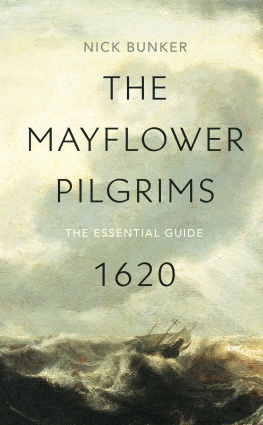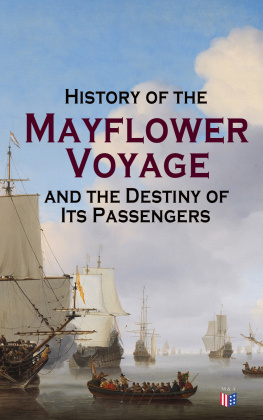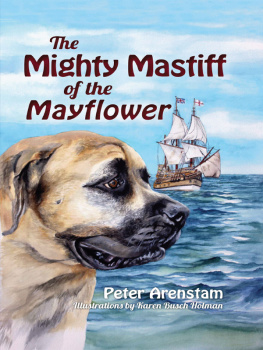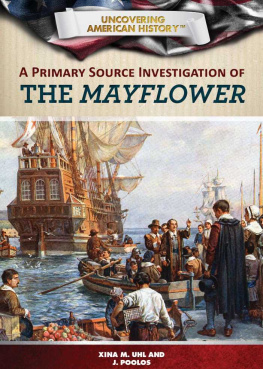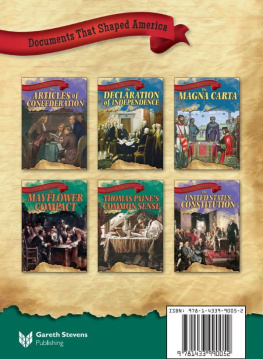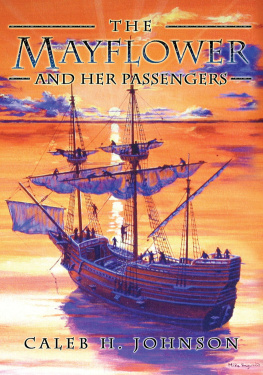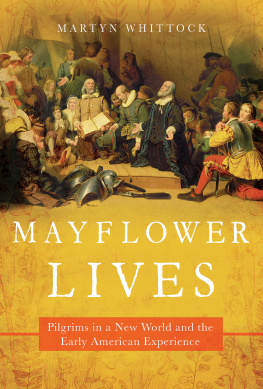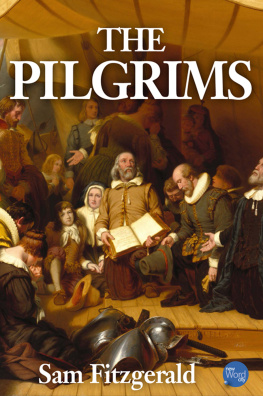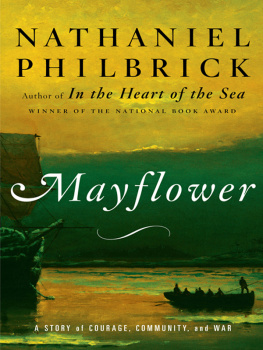Nick Bunker - The Mayflower Pilgrims: 1620
Here you can read online Nick Bunker - The Mayflower Pilgrims: 1620 full text of the book (entire story) in english for free. Download pdf and epub, get meaning, cover and reviews about this ebook. year: 2020, publisher: Random House, genre: Art. Description of the work, (preface) as well as reviews are available. Best literature library LitArk.com created for fans of good reading and offers a wide selection of genres:
Romance novel
Science fiction
Adventure
Detective
Science
History
Home and family
Prose
Art
Politics
Computer
Non-fiction
Religion
Business
Children
Humor
Choose a favorite category and find really read worthwhile books. Enjoy immersion in the world of imagination, feel the emotions of the characters or learn something new for yourself, make an fascinating discovery.
- Book:The Mayflower Pilgrims: 1620
- Author:
- Publisher:Random House
- Genre:
- Year:2020
- Rating:4 / 5
- Favourites:Add to favourites
- Your mark:
- 80
- 1
- 2
- 3
- 4
- 5
The Mayflower Pilgrims: 1620: summary, description and annotation
We offer to read an annotation, description, summary or preface (depends on what the author of the book "The Mayflower Pilgrims: 1620" wrote himself). If you haven't found the necessary information about the book — write in the comments, we will try to find it.
Nick Bunker: author's other books
Who wrote The Mayflower Pilgrims: 1620? Find out the surname, the name of the author of the book and a list of all author's works by series.
The Mayflower Pilgrims: 1620 — read online for free the complete book (whole text) full work
Below is the text of the book, divided by pages. System saving the place of the last page read, allows you to conveniently read the book "The Mayflower Pilgrims: 1620" online for free, without having to search again every time where you left off. Put a bookmark, and you can go to the page where you finished reading at any time.
Font size:
Interval:
Bookmark:



Nick Bunker is the author of An Empire on the Edge: How Britain Came to Fight America ,Young Benjamin Franklin: the Birth of Ingenuity and Making Haste from Babylon: the Mayflower Pilgrims and their World. In 2015 An Empire on the Edge won the George Washington Prize in the United States and it was a finalist for the Pulitzer Prize for History. In 2010 Making Haste from Babylon was longlisted for the Samuel Johnson Prize for Non-Fiction. A graduate of Kings College, Cambridge, and Columbia University, Bunker lives in Lincolnshire with his wife Susan and their otterhound, Champion Teckelgarth Mercury.
ALSO BY NICK BUNKER
Making Haste from Babylon: The Mayflower Pilgrims and Their World
An Empire on the Edge: How Britain Came to Fight America
Young Benjamin Franklin: The Birth of Ingenuity
A pest, a fanatic and a hypocrite, worse than a cattle thief : that was a Puritan, said King James I of England. Despite his many talents, the king had many flaws, and we cannot trust him to describe men and women whom he loathed. We have to find a less insulting way to define them, briefly but with fairness. Without such a definition, what follows will make very little sense.
The word Puritan first appeared early in the reign of Queen Elizabeth, in about 1565. Puritans were people who believed that she failed to go far enough when she established a Protestant Church of England. They urged her to abolish every last trace of Roman Catholic ritual that still lingered within it. They also wished to see an end to the hierarchy of bishops that the queen had left intact.
Her Majesty had not the slightest intention of agreeing to these demands. So, if Puritans could not have the kind of official religion they wanted, they chose to look for God in private. As the law required, they went to their parish church every Sunday, but at home they prayed, discussed sermons, and studied the Bible.
Mainly, Puritans read the book of Genesis, the letters of Saint Paul, and the Psalms. In the New Testament, they also paid special attention to the Acts of the Apostles. Here they found the story of the early Church, and a portrait of Christianity in what seemed to be its most authentic form. Free from distortion by popes and cardinals, it offered a model they felt obliged to copy.
Before the English Civil War, almost every single Puritan was also a Calvinist. What did this label signify? It meant that they followed the teachings of the French reformer John Calvin, who died in 1564.
For Calvin, God was an absolute monarch, a king who created the universe and then sustained it at every moment by a supreme act of will. But if God was almighty, and foresaw everything that occurred, then before the beginning of time he must have decided already the fate of each human soul. This was called the doctrine of double predestination.
Like Calvin, English Puritans believed that God had divided the human race in two. Before they were born, those chosen to receive the gift of faith were set apart for eternal life. They were called the elect. The remainder of humanity were doomed to punishment forever. Try as they might, they could never obtain salvation, and so they were known as the lost.
Did these ideas make men and women fatalistic? If human beings could not change the mind of God, why bother with faith, hope and charity at all? In fact, Calvinists reached the opposite conclusion. If Christians wanted to be sure that they belonged to the elect, it was all the more important to do good deeds and to worship correctly. To persevere in holiness gave them the best evidence that they were saved.
Among the Puritans in England, some of those who persevered the most were a small minority known either as Separatists or as Brownists, after the founder of their movement, Robert Browne. In terms of theology, Separatists were strict Calvinists too, but they carried Puritan beliefs as far as they would go. They argued that the Church of England was beyond redemption because of its Roman Catholic past. In their eyes, it bore the marks of Satan, not those of Jesus Christ.
Because of this, Separatists felt compelled to do more than read and pray in private. They decided to leave the established Church entirely and set up alternative congregations. Untainted by the influence of Rome, these assemblies would be pure in their membership, and in the way they worshipped. In 1593, Parliament and Queen Elizabeth made Separatism a crime. Three decades later, a band of refugee Separatists would sail to America on the Mayflower to create the Plymouth Colony on the coast of what is now the state of Massachusetts. The Mayflower passengers of 1620 were the people whom history has come to know as the Pilgrims.
Nothing would bee done for a Plantation until some hundred of your Brownists of England, Amsterdam and Leyden went to New Plimouth.
C APTAIN J OHN S MITH , T RUET RAVELS , A DVENTURES , ANDO BSERVATIONS (1630)
Easter week in 1580 was far hotter than usual. On Wednesday, 6 April, at six oclock the working day was finished, and the English were eating, drinking, or at play: or, if they were devout, they might be listening to a midweek sermon, as they were in a church opposite Newgate Prison. Later, it was claimed that boatmen felt a strange unquietness in the waters of the Thames. If so, it was the only sign that anything was wrong.
Suddenly, on the south coast, people heard a detonation like the firing of cannon at sea. For weeks, the locals had been readying defenses against the danger of a Spanish invasion. Perhaps, for an instant, they feared that this was the first salvo of a bombardment. Before the noise died away, the ground began to move under the impact of the most severe earthquake to strike England for more than a century.
It began when a fault slipped twenty miles beneath the Strait of Dover, sending shock waves south to Normandy and as far north as York. As it ended, Londoners heard ragged chimes from a hundred parish churches, as the tremor caused the bells to ring a disorderly peal. Some panicked, like lawyers dining in the Inns of Court, who ran out into the street with their knives still in their hands. Others blamed their quivering wainscots on rats or weasels. The earthquake lasted less time than it took to say the Lords Prayer.
Only two people died. One was a shoemakers boy, killed by a falling stone as he sat beneath the minister at Christ Church, Newgate. A serving girl beside him succumbed to her injuries later. Apart from that, damage was modest: a church tower in Kent cracked from top to bottom, flooding on the French coast, and a fallen wall at Dover Castle. But although it ranked low on the Richter scale, in the Elizabethan mind the tremor became another dreadful warning of punishment for sin.
Separatism took shape during this period, the early 1580s, when its protagonist, Robert Browne, achieved notoriety. Some of those who travelled on the Mayflower were at school, at university, or starting apprenticeships: at least seven of her passengers were already aged between eight and eighteen. Exposed to new ideas taught by young school-masters, by equally youthful academics, or by preachers from the pulpit, they were also far more likely to be literate than earlier generations.
Next pageFont size:
Interval:
Bookmark:
Similar books «The Mayflower Pilgrims: 1620»
Look at similar books to The Mayflower Pilgrims: 1620. We have selected literature similar in name and meaning in the hope of providing readers with more options to find new, interesting, not yet read works.
Discussion, reviews of the book The Mayflower Pilgrims: 1620 and just readers' own opinions. Leave your comments, write what you think about the work, its meaning or the main characters. Specify what exactly you liked and what you didn't like, and why you think so.

